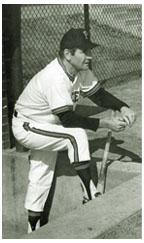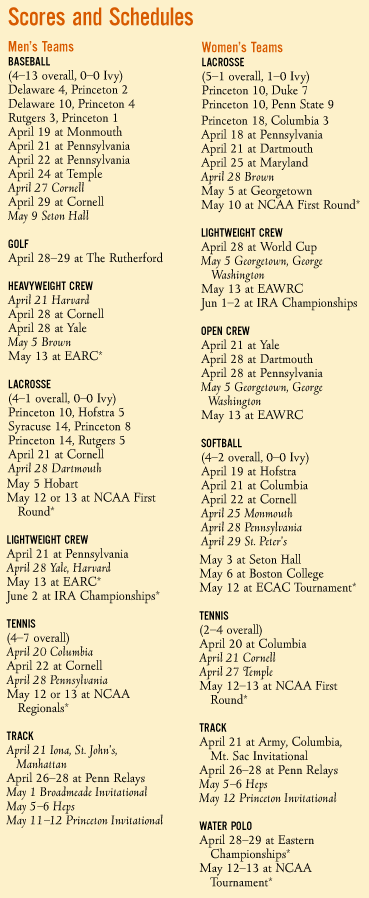|
April 18, 2001: Sports Tigers can't strong-arm Ivies anymore: Pitching depth is a concern for Princeton Sports Web Exclusives! Matt Golden's From the Cheap Seats column Tigers
can't strong-arm Ivies anymore Money in the bank. That's how Princeton baseball coach Scott Bradley came to view the first game of every Ivy League weekend the last two seasons. Like clockwork, six-foot, 11-inch ace Chris Young '02 would trot out to the mound and gun down overmatched hitters in pacing the Tigers to an easy win. When Bradley, who played professionally with the New York Yankees, Seattle Mariners, Chicago White Sox, and Cincinnati Reds, took over the baseball program in 1997, he knew pitching was the name of the game. So the former catcher set his sights on strong-armed hurlers. He recruited Young, probably the greatest pitcher in school history, and a year later landed Scott Hindman '03 - a six-foot, four-inch lefty whose fastball made Young's 88-91 mile-per-hour heat look like it was stuck in rush-hour traffic. With that one-two punch at the front of the Tigers' pitching rotation, Princeton figured to run roughshod over the Ivies this season and return to the NCAA tournament - where, last year, Princeton nearly upset the fifth-ranked Houston Cougars. But gone are Bradley's top guns - Young to a professional contract with the Pittsburgh Pirates and Hindman to elbow surgery - and gone is Princeton's aura of invincibility. Bradley explains, "We are going to have to win games differently this year. Our pitching depth is nowhere near where it has been in the past. We are going to give up some runs, but we need to battle through that and win some games 8-5 or 9-6." Ryan Quillian, a sophomore who compiled a 4-2 record and 4.85 earned run average as a freshman, steps into Young's former role as the Tigers' ace. Quillian is not overpowering, but his command of the strike zone and poise on the mound should help him consistently deliver quality starts. David Boehle '03 will follow Quillian in the rotation. Last season's biggest surprise, Boehle dominated in a key bullpen role last spring. Using a devastating change-up, he registered a 3-3 record and 1.91 ERA while tallying a school-record nine saves. In his first outing this season, against 12th-ranked Oklahoma State, Boehle struggled to make the adjustment from relieving to starting. Bradley says, "He threw 90 pitches in just under three innings. We could see he still had that closer's mentality - that the game is on the line with every pitch. So we've tried to convince him that he needs to be more economical with his pitches and get outs early in the count, rather than trying to be perfect with each pitch. In his second outing, against Duke, he threw around 80 pitches and completed seven innings." Juniors Tom Roland and Chris Higgins are likely to round out a Tiger rotation that will be asked to go deep into games. "Our starters need to realize that their job is to keep us in games," Bradley says. "They need to be mentally tough enough to stay in a ballgame after they've given up some runs. "And we will try to stretch them out longer into games. Last year and in the past, with Boehle and Jeff Golden '99 in the bullpen, we could get six or seven innings out of the starter and feel really good about our chances. This year we just don't have that luxury." Without that safety net, Bradley will look to sluggers Max Krance '01 and Andrew Hanson '01 to give the Tiger staff some breathing room. "You know going into it that we need to score some runs, and a lot of our success will depend upon what Krance and Hanson do in the middle of the lineup," Bradley explains. Before heading into Ivy play, the Tigers faced two top-20 teams (Oklahoma State and Rutgers) and a southern slate that included Duke, UNC-Wilmington, Coastal Carolina, and Delaware - all perennially strong teams. Despite coming through that stretch with just a 4-13 record, Bradley believes the beefed-up schedule will benefit his team. He says, "We just have to talk to our kids to ensure that they don't get discouraged early in the season. We are not going to get an at-large bid to the NCAA tournament coming out of the Ivy League. So I want us to compete against good baseball teams and improve as the season goes along. "On our trip we
faced pitchers throwing 90 miles per hour with good breaking balls.
As long as our hitters don't give up on themselves, this is going
to make us much tougher when we start playing the teams in our league."
By M.G.
Eddie Donovan died March
15 at his home in Princeton. He was 91. Donovan coached baseball,
football, and basketball and taught squash, tennis, and golf at
Princeton during a career that spanned 55 years. He came to Princeton
in 1943 and was placed in charge of athletics in the Navy V12 program.
In 1952 he became head coach of Princeton's baseball team and held
that position until 1975. Donovan also coached junior varsity football
and freshman basketball. With his wife, Betty, Donovan wrote My
55 Years at Princeton, a book about his Princeton experience. A
memorial service was held at the University Chapel on April 14.
Men's
lacrosse takes 3 of 4 against top teams At the start of the men's lacrosse season, Princeton's stiffest competition for the NCAA title seemed likely to come from defending champion Syracuse. The Orangemen did nothing to disprove that theory in beating the Tigers 14-8 in Syracuse on March 24. The loss ended the three-game winning streak with which Princeton had begun the season, but those convincing victories over Johns Hopkins, Virginia, and Hofstra keep the Tigers strong favorites to bring home their seventh straight Ivy League title and compete for the national championship in May. Trevor Tierney '01, the team's starting goalie, said that Princeton's fourth straight loss to Syracuse was educational, if not enjoyable. "Playing them is the only way to prepare for them in the playoffs," Tierney said. "They have figured us out. One of their players in an interview said that John Desko, their head coach, changed their philosophy so they could beat Princeton. I think we have to make some changes to beat Syracuse." In each of its three wins, Princeton has displayed balanced scoring and a stingy defense. Attackman Ryan Boyle '04 leads the team in both assists and total points, having netted four goals to go with six assists. Four of those came in the season-opening, 8-4 win against Johns Hopkins on March 3, a game the Tigers controlled throughout. Boyle also notched two goals and an assist in a 10-5 win at Hofstra on March 17. Matt Striebel '01, who has led the team in assists each of the last two years, has shown a much more balanced game this year. "Striebel's developed to a point where we can play him anywhere and he can cause problems," said head coach Bill Tierney. Striebel scored three of his five goals in an 8-4 win over the University of Virginia on March 10 and has continued his generous distribution of the ball with four assists. As it has the past two seasons, Princeton has gotten considerable offensive help from B. J. Prager '02, who has scored five goals in three games. And Sean Hartofilis '03 picked up where he left off in last year's NCAAs: He has six goals so far this year, equalling his total from the Final Four. The quartet's consistency has been as impressive as its balance. All four players have tallied a goal or an assist in every game they've played. Princeton has also gotten important cameos from other players. Will MacColl '03 came into the Virginia game with the Tigers up 5-4 in the fourth quarter and sealed the win by scoring two goals and assisting on another, and Dan Clark '02 had two goals against Hopkins. Integrating all of that talent into the offense has been a challenge at times. "The different players that are rotating in are still getting used to each other," said Trevor Tierney. "We have so many weapons that everyone is figuring out their roles right now. In the first three games, the offense scored at opportune times and controlled the ball when the defense needed a break. Once our offense starts clicking, we will be scoring a lot of goals against anyone." Though the Tigers couldn't corral Syracuse, they have been otherwise dominant in the defensive half of the field. Goalie Tierney has made 50 saves while allowing only 27 goals, a ratio among the best in the nation. Defenseman Ryan Mollett '01 held Virginia's first-team, All-America attackman Conor Gill to one assist and has generated some offense himself, scoring a goal against Syracuse and an assist against Hofstra. The other two starters on defense, Damien Davis '03 and Scott Farrell '02, have been less spectacular but just as steady and suffocating, and coach Bill Tierney's four-man rotation of longstick defensemen has worked well. None of that stopped Syracuse, which runs fast breaks better than any team in college lacrosse. Princeton's defensive strength has for years been its ability to anticipate and react to an offense's next move, but Syracuse's skill proved too much for such an approach. "Syracuse has a knack for finding that extra open guy," Mollett said. "It seems like with other teams, we slide and we can rotate faster than the ball moves, but when we play Syracuse the ball moves faster than we can rotate." Tierney began this season
hoping to use more players than in any year during his tenure at
Princeton, and he's done so. The costs of developing such depth
can be apparent early in the season, when players are still adjusting
to their roles, but the benefits can be substantial in May, when
teams with superior numbers often wear down opponents with weaker
benches. Princeton's first three games suggest that the Tigers will
have the chance to find out how substantial those benefits will
be at NCAA Tournament time. By David Marcus '92 David Marcus is a frequent contributor to PAW.
|
|||||||


